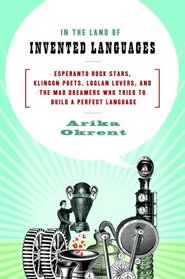Helpful Score: 2
Fabulous. This book briefly acquaints the reader with a few of the over 900 recorded invented languages, and the personalities-- often very colorful-- behind them.
Okrent does a great job of contextualizing the languages, discussing the reasons that Philosophical Language vs. Esperanto vs. Loglan, for example, were invented in their particular time periods and cultural environments. She also talks about the inventors' individual motivations to produce a "perfect" language; I was truly amazed by the effort and dedication that went into some of these systems, usually with very disappointing results for their creators.
I definitely came away with more appreciation not only for the hard-working inventors of "logical" and "universal" linguistic systems, but for living, natural languages in all their maddening, grammar-defying, colorful glory... although if someone wants to take a crack at "fixing" Bengali spelling, I'm not sure I'd really complain. ^.^
Okrent does a great job of contextualizing the languages, discussing the reasons that Philosophical Language vs. Esperanto vs. Loglan, for example, were invented in their particular time periods and cultural environments. She also talks about the inventors' individual motivations to produce a "perfect" language; I was truly amazed by the effort and dedication that went into some of these systems, usually with very disappointing results for their creators.
I definitely came away with more appreciation not only for the hard-working inventors of "logical" and "universal" linguistic systems, but for living, natural languages in all their maddening, grammar-defying, colorful glory... although if someone wants to take a crack at "fixing" Bengali spelling, I'm not sure I'd really complain. ^.^




